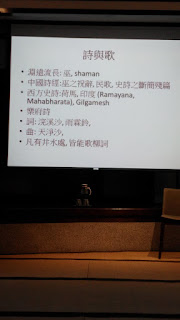


文字轉生到世界的其他方法便是聲音。原本可以安穩待在紙張上,加入聲音,音樂的成分便有了其他可能性。
聲調大小,高低,樂器音色,音域,排列組合變化之下,一個又一個的分身創造了出來,又或者原本的文字也只是眾多形式的分身之一。
中國詩的起源和巫的儀式糾纏,作為一個上下通達的巫,藉由詩來傳遞未可知。對於思而不可得的煎熬便由詩加點音樂來排解。
從詩經,楚辭和其他古詩詞中,可以發現其在生活中種種場合所需要的儀式和功能性。
關關雎鳩,在河之洲。窈窕淑女,君子好逑。
參差荇菜,左右流之;窈窕淑女,寤寐求之。
求之不得,寤寐思服;悠哉悠哉,輾轉反側。
參差荇菜,左右采之;窈窕淑女,琴瑟友之。
參差荇菜,左右冒之;窈窕淑女,鐘鼓樂之。
參差荇菜,左右流之;窈窕淑女,寤寐求之。
求之不得,寤寐思服;悠哉悠哉,輾轉反側。
參差荇菜,左右采之;窈窕淑女,琴瑟友之。
參差荇菜,左右冒之;窈窕淑女,鐘鼓樂之。
在誦讀本身便有平仄的區別。而英詩中,十四行詩sonnet的規定,在韻腳中表現出來。
Sonnet 18: Shall I compare thee to a summer’s day? By William
Shakespeare
Shall I compare thee to a summer’s day?
Thou art more lovely and more temperate:
Rough winds do shake the darling buds of May,
And summer’s lease hath all too short a date;
Sometime too hot the eye of heaven shines,
And often is his gold complexion dimm'd;
And every fair from fair sometime declines,
By chance or nature’s changing course untrimm'd;
But thy eternal summer shall not fade,
Nor lose possession of that fair thou ow’st;
Nor shall death brag thou wander’st in his shade,
When in eternal lines to time thou grow’st:
So long as men can breathe or eyes can see,
So long lives this, and this gives life to thee.
由歌還原為詩,在Bob Dylan 被宣布為諾貝爾獎得主後,也不足為怪。整理要素組合出來的氛圍才是詩所要引發的想像。例如Starry Starry night, 或是sound of silence 以歌的形式將lyric 歌詞變化有如誦詩的源遠流長。
廖老師現場開起小型演唱會,獻唱了「長夏」和「未經」。窗外有雨,但不覺有聲了。
現場直擊,請見 https://www.youtube.com/watch?v=ryj4Z4gAvYM
沒有留言:
張貼留言